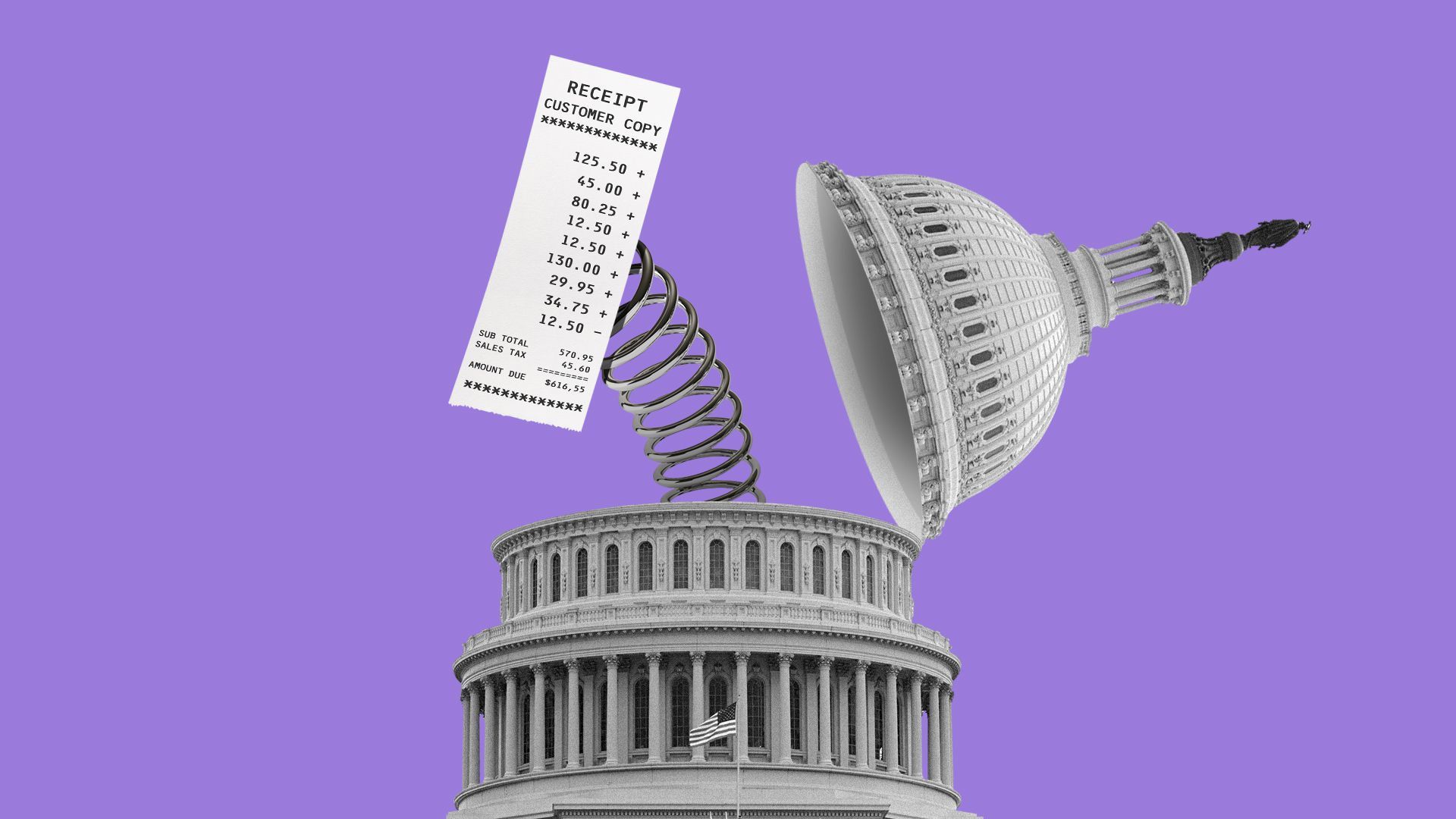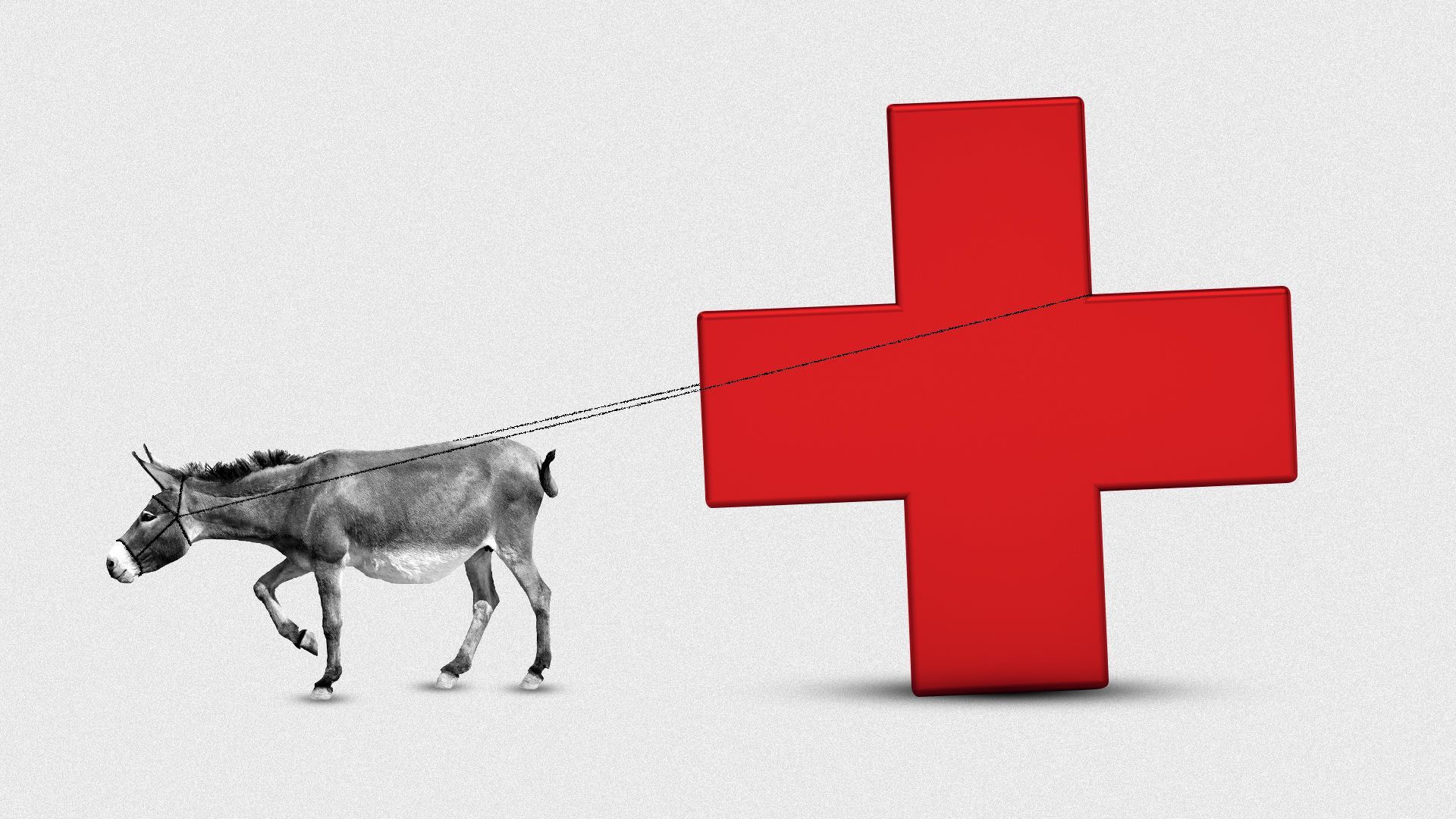| |
| |
| |
| Presented By Blue Cross Blue Shield Association |
| |
| Axios Vitals |
| By Tina Reed ·Jun 18, 2021 |
| Good morning. Today's newsletter is 1,081 words, or a 4-minute read. Worth your time: Axios' Bryan Walsh explores the "dubious return of the handshake." - This despite folks like Anthony Fauci once saying: "I don't think we should ever shake hands ever again, to be honest with you."
- It's part of a post-pandemic etiquette guide in the new Axios What's Next newsletter. Go check it out!
|
| |
| |
| 1 big thing: The surprise billing fight isn't over |
 |
|
| Illustration: Aïda Amer/Axios |
| |
| Washington's latest health care brawl is over wonky questions about how last year's law banning surprise medical bills will now actually be implemented by the Biden administration, Axios' Caitlin Owens reports. Why it matters: Billions of dollars are at stake — either for providers or for patients and employers. The big picture: Last year's legislation prevents patients, in most cases, from getting surprise medical bills when they get out-of-network care. If providers and insurers can't agree on the reimbursement amount, either party can bring the issue to an independent arbitrator. - The administration is tasked with filling in the details of how this arbitration process will work. Its first deadline for these regulations is July 1, with additional ones expected later this year.
Driving the news: Nearly 100 members of Congress sent a letter last night to the administration encouraging it to "[ensure] a balanced process to settle payment disputes between health plans and providers." - The letter, led by Reps. Tom Suozzi and Brad Wenstrup and provided exclusively to Axios, reflects providers' concerns that the implementation rules will bend the arbitration process in insurers' favor.
- "The dispute resolution process established in the No Surprises Act prevents artificially low payment rates that would incentivize insurance companies to keep providers out of their networks," the letter argues.
The other side: A competing letter obtained by Axios encourages the administration to swing in the other direction. - "We have significant concerns ... that expanded arbitration considerations could place undue harm and financial burdens on consumers," the letter, led by Rep. Jan Schakowsky, writes.
The bottom line: In health care, every dollar spent goes toward someone else's salary. That means that when it comes to who has power over payment rates, there will always be winners and losers. |
    |
| |
| |
| 2. The Obamacare wars end in a whimper |
 |
|
| Illustration: Shoshana Gordon/Axios |
| |
| Existential threats to the Affordable Care Act just aren't what they used to be, Axios' Sam Baker writes. The big picture: The anti-Obamacare fire on the right may not be fully extinguished, but it has petered out into irrelevance, dismissed as a distraction even by some of the same conservatives who helped stoke it in the first place. Driving the news: The GOP lawsuit that the Supreme Court tossed aside yesterday sought to overturn the entire health care law. It won in the lower courts. And it arrived at a Supreme Court that's more conservative than it's been in years. - Technically, the stakes were just as high as they've been in the past, but this ruling didn't come as a surprise to anyone, and hardly anyone had taken seriously the prospect that the court might actually overturn or seriously weaken the law.
- Health insurers, for example, continued to increase offerings in the ACA's insurance markets while this suit was pending.
The bottom line: The politics of the ACA seemed to have died down even before this lawsuit was filed. While we may still see the occasional volley slung in Obamacare's direction, this war is over. We all know who's won. Go deeper: Health care ruling saves Republicans from themselves |
    |
| |
| |
| 3. Dems' high-risk, high-reward health care push |
 |
|
| Illustration: Aïda Amer/Axios |
| |
| Democrats are considering including major health care reforms in a massive legislative package that could be passed without Republican votes, teeing up a grueling fight with the health care industry — and, potentially, each other, Caitlin writes. Why it matters: Expanding coverage and lowering drug prices have long been top priorities for Democrats. This may be their best opportunity to accomplish these goals. Driving the news: Democrats are preparing a multi-trillion dollar package to pass through budget reconciliation, a process that allows legislation to pass the Senate with only 51 votes. - They're considering including measures that would lower the Medicare eligibility age from 65 to 60, expand the scope of benefits it offers, and lower drug prices, the Washington Post reported yesterday.
- A draft document of potential measures that could be in the package included allowing Medicare to negotiate prescription drug prices, a Senate Democratic aide confirmed to Axios.
What they're saying: "The idea of expanding either Medicaid or Medicare doesn't sound like some socialist nightmare to most people. It sounds great to most people," said Sen. Brian Schatz, D-Hawaii. - "The pandemic has, I think, demonstrated to most people — in their actual lives, not as an abstraction, but in their actual lives — the wisdom of expanding access to health care for everybody."
Go deeper. |
    |
| |
| |
| A message from Blue Cross Blue Shield Association |
| Expanding access to care |
| |
 |
| |
| 90% of Americans have health care coverage through their jobs, the individual market, Medicare or Medicaid. We can build on what we have to achieve universal coverage, lower costs and make health care more equitable. See how Congress can help. |
| |
| |
| 4. COVID variant gains foothold in U.S. |
 |
|
| Illustration: Sarah Grillo/Axios |
| |
| Public health officials are renewing calls for COVID-19 vaccinations as a more infectious variant spreads rapidly in the U.S., Axios' Alison Snyder and Eileen Drage O'Reilly report. Why it matters: The B.1.617.2 (or Delta) variant was first detected in India and is expected to become the dominant strain in the U.S. in three to four weeks, some researchers say. It can be thwarted with available vaccines. But if vaccination rates continue to slow, the variant could fuel surges in pockets of the country this fall. - More transmissible variants continue to supplant previously dominant strains, raising the stakes for the unvaccinated and reminding Americans that the pandemic isn't over.
- The steady uptick in B.1.617.2 "very much mirrors what happened in the United Kingdom about a month ago. And so I fully expect that sometime in the next three or four weeks, the Delta variant will be the dominant SARS-CoV-2 lineage in the U.S.," says Andrew Pekosz, a virologist at the Johns Hopkins Bloomberg School of Public Health.
The bottom line: "If you get the vaccine, you'll have less to worry about with a variant. It really is that simple," Pekosz says. |
    |
| |
| |
| 5. Catch up quick |
 |
|
| Beaumont Health's main hospital campus in Royal Oak, Mich. Photo: Beaumont Health |
| |
- Spectrum Health and Beaumont Health have signed a merger agreement that would combine a health insurance company and 22 hospitals into one tax-exempt system with almost $13 billion in annual revenue, Axios' Bob Herman reports.
- The Biden administration will invest $3.2 billion to foster the development of antiviral pills to help fight against COVID-19, HHS announced Thursday. The hope is the medication becomes available to the public as soon as the end of this year, Axios' Marisa Fernandez writes.
- The pandemic-caused recession and a federal requirement that states keep Medicaid beneficiaries enrolled until the national emergency ends swelled the pool of people in the program by more than 9 million over the past year, Kaiser Health News reported.
|
    |
| |
| |
| 6. Dog of the week |
 |
|
| Cornelius. Photo by: Cailin Kearns |
| |
| Meet Cornelius, a french bulldog who is enjoying the flowers outside of the Monocle restaurant on Capitol Hill in Washington, D.C. (Editor's note: This is a mood and I'm here for it.) - "Much like Ferdinand the Bull, he loves to stop and smell the roses," says mom Cailin Kearns, an assignment editor at Fox News Channel.
|
    |
| |
| |
| A message from Blue Cross Blue Shield Association |
| Continuing the fight for America's health |
| |
 |
| |
Nationwide, Blue Cross and Blue Shield companies are supporting communities and helping Americans get vaccinated by: - Building confidence in vaccines.
- Partnering to meet local needs.
- Connecting with the most at-risk.
For the health of America. |
| |
| 📬Thanks for reading! Please invite your friends, family, colleagues to sign up here for Vitals! |
 | | The tool and templates you need for more engaging team updates. | | |











No comments:
Post a Comment